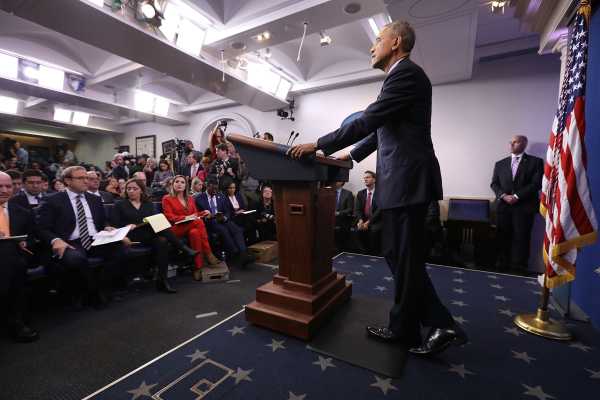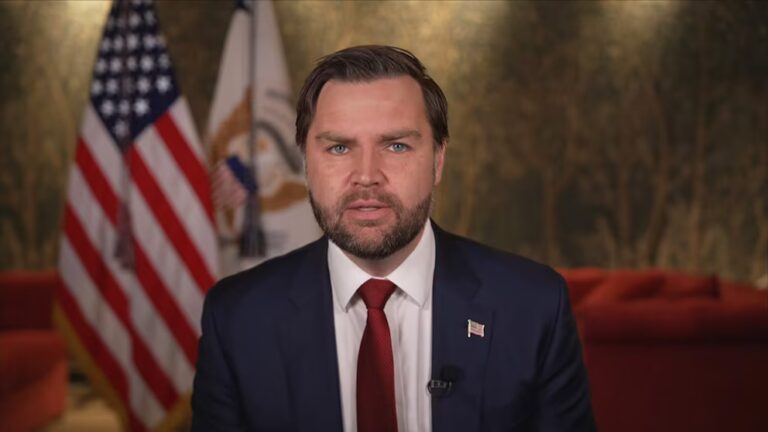
The Trump administration took its war with the media to the next level this week when federal authorities seized years of phone records from New York Times reporter Ali Watkins as part of a federal investigation into leaks of classified information.
Watkins, who previously worked for BuzzFeed News and Politico, had a three-year relationship with James Wolfe, a former Senate Intelligence Committee aide who was arrested on Thursday and charged with lying to federal agents investigating the classified leaks.
The seizure set off alarm bells about the relationship between the administration and the media. The Department of Justice under Obama took phone records from Associated Press reporters and editors, named a Fox News reporter an unindicted “co-conspirator” in a leak case, and prosecuted multiple cases involving whistleblowers and leakers. So is what Trump doing more of the same? Or is a president who routinely bashes the media and threatens to jail leakers finally turning his rhetoric into reality?
“It’s deeply alarming that the Trump administration has decided to build off of the worst of the Obama legacy on leak investigations and reporter-source protection,” said Alexandra Ellerbeck, the North America program coordinator for the Committee to Protect Journalists.
I asked Ellerbeck and five other experts what they make of the Justice Department’s latest actions and how they compare to what the Obama administration did. The general response: What Obama did was bad, and what Trump is doing is likely worse.
Their responses, edited for clarity and style, are below.
David Schulz, senior counsel, Ballard Spahr LLP, and director of the Media Freedom and Information Access Clinic at Yale Law School
The government’s secret collection of a reporter’s telephone and email records to locate a confidential source is a matter of grave concern. Alarms went off when the Obama administration seized the phone records of several AP bureaus in 2013, and alarms are going off today. A free and independent press able to reveal the truth about the actions of government is crucial in a democracy, and a reporter’s ability to promise confidentiality is essential to getting the truth. It is a matter of human nature and simple logic.
The constitutional implications of governmental interference in the relationship between reporters and their sources have been recognized at least since President Nixon sat in the Oval Office nearly 50 years ago. Since then, Department of Justice guidelines have required government agents to exhaust alternative sources before seeking to compel information from the press, to minimize the scope of information requested from a reporter, and to notify the press in most circumstances so they can seek appropriate protection from a court before the government takes its records. Apparently, none of this happened here.
The department’s actions revealed yesterday cry out for a full and immediate public accounting, as provided by Attorney General [Eric] Holder in the aftermath of the AP incident. In particular, why were so many years of records taken? Department of Justice regulations require that, in all cases and without exception, a subpoena for a reporter’s telephone records must be “as narrowly drawn as possible.”
And why was no advance notice given to the reporter, so that a judge — and not a prosecutor alone — could decide whether the seizure would violate the constitutional protection of the press? Under current rules, such a step can only properly be taken if prior notice would “pose a substantial threat to the integrity” of an investigation, a claim that cannot credibly be made in this case where the source was already aware of the existence of the investigation.
The concerns raised by this secret governmental seizure are not just that it has happened, but also with what will happen next. The years’ worth of records likely reference communications with a number of sources on a wide range of stories — information the government has no conceivable right to know.
Who will have access to this information, and what will be done with it? Will it be reviewed only on a need-to-know basis by those working on this investigation, or made available more broadly to search for other leakers? Will records of communications by government staff be kept in personnel files and contacts with reporters taken into account in employment evaluations? The potential for misuse of the information is staggering and only compounds the need for an immediate accounting by the Department of Justice.
Julian Sanchez, senior fellow, the Cato Institute
I don’t think it can be argued that the DOJ is breaking fundamentally new ground here, in light of the subpoenas for phone records directed at the Associated Press and the monitoring of James Rosen during the Obama administration.
The scope of the information-gathering on Watkins seems quite extraordinary, however, encompassing both telephone and email records reportedly stretching back, not for a few months, which is what we’ve previously seen in leak investigations focused on the origins of specific news stories, but spanning several years. That strikes me as significant because it means they’re not just getting a snapshot of what a reporter was working on at one particular moment, which is fraught enough, but in effect a detailed map of the source network she’s built up over the whole of her career.
Alexandra Ellerbeck, North America program coordinator, the Committee to Protect Journalists
This is the first instance, that we know of, in which the Trump administration has gone after a journalist’s communications records. There is nothing more vital to a functioning press than the ability of journalists to protect their sources, so the seizure of a journalist’s communications records sets a dangerous precedent.
The past decade has seen repeated federal assaults on the ability of journalists to protect their sources. Under the Obama administration, the Justice Department came under fire for subpoenaing outgoing call records from 20 phone lines belonging to AP reporters or editors. The Obama administration also set the record for leak-related prosecutions. After the public outcry, the administration did make some modest positive steps. New leak prosecutions quieted down and the administration revised internal guidelines to make it harder to obtain journalist records.
It’s deeply alarming that the Trump administration has decided to build off of the worst of the Obama legacy on leak investigations and reporter source protection. Attorney General Jeff Sessions has called for putting leakers in jail, and President Trump allegedly even floated the idea of putting journalists themselves in jail. Last fall, Sessions expressed a desire to roll back some of the protections put in place at the end of Obama’s term. So far, however, they are still in place. We urgently need an explanation of how the troubling actions taken by the DOJ adhere to the guidelines they have set out for themselves.
Jonathan Turley, law professor, George Washington University
The case raises a troubling pattern of surveillance targeting journalists. The Obama administration’s targeting of Rosen was far more serious, however.
In this case, the journalist had an alleged intimate relationship with the target who was sharing highly classified information. That type of “pillow talk” risk is one of the primary dangers facing the government over the release of information. Indeed, it is a common tactic by foreign powers. The alleged use of such intimate relationships by a journalist raises serious journalistic ethical concerns.
Nevertheless, the targeting of a journalist should be the last, not first, response. It is not clear if this was necessary since the targets emails and phone records were available. Moreover, recording [Rosen’s] conversations would inevitably include some calls with the journalist. Thus, it is not clear why the government would need to target the reporter or her communications.
While the Supreme Court has sharply curtailed the constitutional protections afforded to journalists and has left them with the same basic protections afforded average citizens, there remains a longstanding policy against such intrusive measures. There is ample reason to be concerned about such cases and legitimate questions that should be answered by the Justice Department. Unfortunately, the Congress has never been a strong advocate of journalistic protections (as opposed to the states which passed shield laws protecting reporters).
Michael Meltsner, law professor, Northeastern University, and author of With Passion: An Activist Lawyer’s Life
Neither the Obama administration then or the Trump administration now has avoided intruding into the important newsgathering role of the press, but it’s a big mistake to equate the two. Attacking the press is pervasive with Trump. Obama practices were situational.
Trump is playing his “nobody can criticize me” card. Wrong as his judgment may have been, Obama was motivated by a view of a government need for confidentiality.
Steven Aftergood, director of the Federation of American Scientists’ project on government secrecy
There are at least two factors that highlight the egregious nature of this move.
First, even though reporter Ali Watkins is not accused or suspected of any criminal activity, her professional life has been unilaterally compromised by the administration. This is unjust and inappropriate on its face.
Second, the work of a reporter is different than that of a farmer or an auto mechanic in a crucial respect. The operation of a free press is a structural element of our political way of life. By interfering in the reporting process in the way that it did, and outside of any judicial procedure that might have allowed the reporters to challenge the action, the administration is undermining the freedom of the press on which we all depend.
Regrettably, this is not altogether unprecedented. The Obama administration took some similar steps in seizing Associated Press phone records in 2013. But the Obama Justice Department seemed chastened by the criticism it received and issued new guidance to moderate and regulate any such moves in the future. The Trump administration appears to have exceeded or ignored that guidance.
Sourse: vox.com






